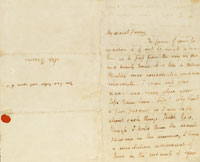 Ian McKay’s weekly column in Antiques Trade Gazette has been running for more than 30 years.
Ian McKay’s weekly column in Antiques Trade Gazette has been running for more than 30 years. Leading Men
The romantic figures of Keats, Wilde, Sir Walter Raleigh, and Jesse James loomed large in recent auctions
Bright Star
Letter from John Keats to Fanny Brawne, £96,000 ($153,800) at Bonhams of London on March 29.
Thought to be the last of his love letters to Fanny still in private hands, this is a reminder of a part of Keats’ life that has fascinated his admirers for almost two centuries, and which quite recently gained a new and very different lease of life with the 2009 release of the film Bright Star.
Fanny lived next door—just the other side of the wall, in one of the semi-detached houses then known jointly as Wentworth Place on London’s Hampstead Heath—but the poet’s recognition that he had contracted the disease that killed his brother, “That drop of blood is my death warrant,” doomed their relationship and allowed for only the most limited physical contact.
In this 1820 letter, Keats refers to this painful constraint and regrets that they cannot kiss. The consumption (TB) that was killing him was considered highly contagious, but he consoles himself with the certainty of her love.
Keats’ friend, Joseph Severn, who was with him when he died the following year, felt that “many of Keats’ letters contained quite as fine poetry as any of his actual poems” and T. S. Eliot described his letters as “certainly the most notable and most important ever written by any English poet,” so it seems only right that the full text of the letter should be reproduced here.
“My dearest Fanny,
The power of your benediction is not of so weak a nature as to pass from the ring of four and twenty hours—it is like a sacred Chalice once consecrated and ever consecrate. I shall Kiss your name and mine where Lips have been—Lips! why should a poor prisoner as I am talk about such things. Thank God, though I hold them the dearest pleasures in the universe, I have a consolation independent of them in the certainty of your affection. I could write a song in the style of Tom Moores Pathetic about Memory if that would be any relief to me. No. It would not. I will be as obstinate as a Robin, I will not sing in a cage. Health is my expected heaven and you are the Houri – this word I believe is both singular and plural—if only plural, never mind—you are a thousand of them.”
A rather more prosaic, if equally poignant note is struck by the words that Keats has scribbled on the envelope, “You had better not come today.”
Fanny wore mourning for many years after Keats’ death and never removed the ring that he had given her, though she did marry in 1833. This letter was presumably among the group of thirty-five love letters to Fanny that in 1885 were sold at auction in London by her son, a sale that Oscar Wilde memorialized and condemned in poetry.
In the past forty years or more, only three other letters in Keats’ hand have appeared at auction. The fact that it was secured at a low estimate delighted its new owner, Keats House, the museum dedicated to the poet’s memory at Wentworth Place.









